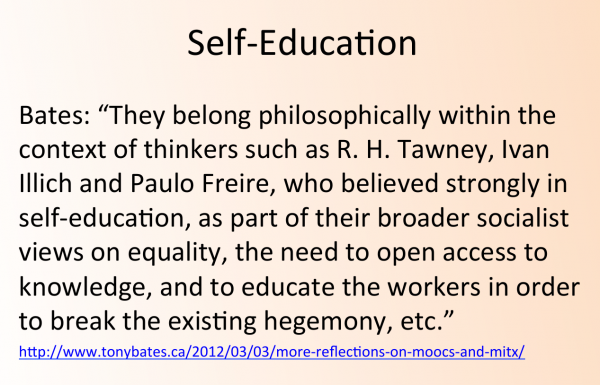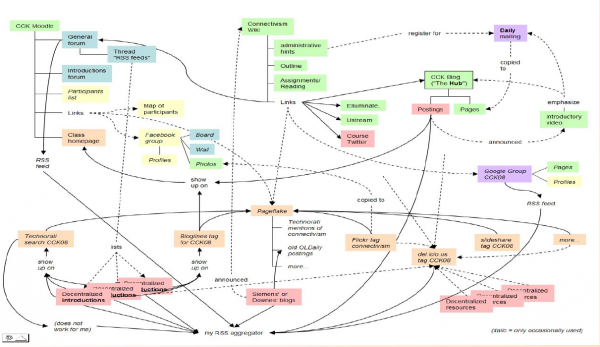MOOCs (BD(14): Unterschied zwischen den Versionen
Anna (Diskussion | Beiträge) K (link) |
Anna (Diskussion | Beiträge) K (audio) |
||
| Zeile 12: | Zeile 12: | ||
<p align="center"> | <p align="center"> | ||
[[Datei:Downes-illich.png|600px]] | [[Datei:Downes-illich.png|600px]] | ||
| + | <br /> | ||
| + | [http://de.wikipedia.org/wiki/Deschooling Entschulung]<br /> | ||
| + | |||
| + | Ivan Illich on deschooling 1<br /> | ||
| + | |||
| + | <mp3player>File:deschooling1.mp3</mp3player><br /> | ||
| + | |||
| + | Ivan Illich on deschooling 2<br /> | ||
| + | |||
| + | <mp3player>File:deschooling2.mp3</mp3player> | ||
| − | |||
<br /> | <br /> | ||
Version vom 20. November 2014, 13:50 Uhr
Inhaltsverzeichnis
The Rise of MOOCs
Are MOOCs an idea that were floating around the halls of universities for some time now, or was the first one in 2008 really a watershed moment?
Many of the ideas that go into a MOOC were around before CCK08 but that course marks the first time the format came together. In particular, we would point to David Wiley's Introduction to Open Education course, which was offered as an open wiki (later called the Wiley Wiki - see https://sites.google.com/site/themoocguide/cck08---mooc-basics ) and Alec Couros's open course ECI831 - Social Media and Open Education (see https://sites.google.com/site/themoocguide/social-media-and-open-education ). These two courses were of course influenced by other work in the field - the concept of open education, in which Wiley was a pioneer, with a license preceeding the Creative Commons licenses, the open wiki, which of course was made famous by Wikipedia, and more.
What makes the MOOC offered by George Siemens and myself different was that it was a distributed course. This is what enabled the 'massive' part of 'Massive Open Online Course'. The software developed to support the course - called gRSShopper, written by myself - was designed to enable the use of open educational resources (OERs) and to aggregate student contributions written using their own weblog environment (and later, discussion boards, Twitter, Facebook, Delicious, and more). I've been working with aggregators since the beginning of RSS and of course have been influenced here by the work of people like Dave Winer and Aaron Swartz, among many others. The OER movement itself has roots in the open access movement, which created the Open Archives Initiative, and eventually the UNESCO OER program.
What made CCK08 a watershed moment was the realization that the use of distributed open resources would support - with ease - an attendance in the thousands. We weren't expecting 2200 people in CCK08; George Siemens has quipped that we were expecting about 24 people, if we were lucky. After all, the course was devoted to a pretty obscure topic - the theory of Connectivism, a pedagogical theory articulated by George and myself. And the software and course design were the first to explictly invoke the theory, and to focus on connections rather than content, which suggested the distributed and connected approach.

Entschulung
Ivan Illich on deschooling 1
<mp3player>File:deschooling1.mp3</mp3player>
Ivan Illich on deschooling 2
<mp3player>File:deschooling2.mp3</mp3player>

Stephen Downes The LMS and the MOOC
Dave Cormier: What is a MOOC. 8.12.2010 (davecormier)
<videoflash type="youtube">eW3gMGqcZQc</videoflash>
Fünf Punkte
- Kurs
- offen
- interaktiv
- verteilt
- lebenslanges Lernen
die Hebelwirkung
Welche Erweiterung erfährt der Terminus "Kurs" durch die Platzierung "Multiple Open Online Course"?
- abrufbar im Internet
- weltweite Teilnahme
- diverse Quellen
Performance, Infrastruktur, Finanzierung, Rechtsfragen, Stars, Profilbildung, Lernprozesse
"want to know about something?"
- wer kommt morgen?
- Wer war Julius Caesar?
- Wie öffne ich diese Dose?
- Wie lauten die Maxwellschen Gleichungen?
- Wieviel ist meine Wohnung wert?
- Warum ist Picasso berühmt?
"information is everywhere"